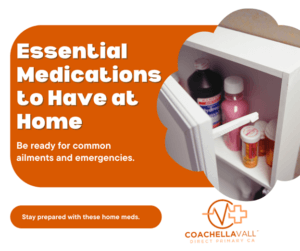Fall Health Tips: Keeping Coachella Valley Families Healthy
Ever watched the leaves tumble down in fall and wondered how your family’s health can also gracefully transition into this new season? Well, you’re not alone.
Like a flock of birds preparing for migration, it’s time we too gear up to navigate through autumn. It may seem like an ordinary change of seasons – but there’s more beneath those colorful leaves!
As the season shifts, it’s important to take steps to maintain good health during autumn. However, don’t let that dampen your pumpkin spice spirit! With hydration strategies even on chilly days, food safety measures at home to avoid unwanted sicknesses…oh and did I mention regular handwashing?
You might think these are all common knowledge. But wait until you see our checklist for unexpected illnesses or learn about the surprising impact sleep has on our well-being…
So, are you all set to take a deep plunge into some exciting stuff? Let’s get started!
Table Of Contents:
- Embracing Hydration for Health
- The Role of Hydration in Overall Health
- Practical Tips for Staying Hydrated
- Ensuring Food Safety at Home
- Steps to Maintain a Clean Food Preparation Area
- Avoiding Cross-Contamination
- The Power of Regular Handwashing
- Proper Handwashing Techniques
- Preparing for Unexpected Illnesses
- Essential Medications to Have at Home
- First Aid Supplies Checklist
- The Importance of Quality Sleep
- Understanding the Role of Sleep in Health
- Tips for Better Sleep
- Regular Checkups and Health Screenings
- Why Routine Doctor Visits Matter
- Navigating Through Health Screenings
- FAQs in Relation to Fall Health Tips for Families
- What are the healthcare tips for fall?
- What are the fall wellness activities?
- What is a good wellness tip for November?
- Conclusion
Embracing Hydration for Health
The significance of consuming sufficient fluids, even in chillier climates, cannot be overstated. Staying hydrated is essential for maintaining our physical wellbeing.
The Role of Hydration in Overall Health
Water is a vital part of every cell in our body. It helps regulate body temperature, lubricates joints, and aids digestion. When we don’t get enough water, these functions can become impaired.
Dehydration can lead to fatigue, dizziness, and confusion – so it’s important to make sure you’re drinking plenty throughout the day.
Practical Tips for Staying Hydrated
To maintain good hydration levels during fall months when it’s easy to forget about drinking water due to cooler temperatures:
- Sip on warm beverages like herbal teas or hot water with lemon.
- Eat hydrating fruits such as apples which are plentiful this season.
- Carry a reusable water bottle around with you at all times.
Remember that your health should always come first. So drink up.
Ensuring Food Safety at Home

Maintaining a clean food preparation area is vital to avoid health risks. Keeping your kitchen surfaces spotless can significantly reduce the chance of foodborne illnesses.
Steps to Maintain a Clean Food Preparation Area
To start, always wash your hands before handling any ingredients. This helps prevent bacteria from spreading onto the food you’re preparing.
Cleanliness doesn’t stop with your hands though; make sure all utensils and surfaces are also sanitized before use. Regularly wiping down countertops with an effective cleaner can help kill harmful bacteria.
Avoiding Cross-Contamination
Cross-contamination happens when bacteria or other microorganisms transfer from one substance to another – usually through improper handling of raw and cooked foods.
To dodge this issue, keep raw meat separate from other ingredients during prep time. Also, remember to thoroughly clean cutting boards after using them for raw products. To avert contamination, there are measures you can take in your own kitchen.
The Power of Regular Handwashing
Handwashing is a simple yet powerful tool in our health arsenal. It’s like having an invisible shield that can help keep us safe from many common germs and viruses.
Proper Handwashing Techniques
To effectively eliminate germs, it’s crucial to get the technique right. Start by wetting your hands with clean running water before applying soap. Lather well, making sure to cover all areas including between fingers and under nails.
Rub your hands together for at least 20 seconds – roughly the time it takes to sing ‘Happy Birthday’ twice. Then rinse thoroughly under running water before drying with a clean towel or air-drying them.
The CDC outlines these steps clearly, emphasizing how this easy routine could be one of our most effective strategies against illness transmission. Remember, hand hygiene isn’t just about protecting ourselves but also those around us.
Preparing for Unexpected Illnesses
No one can predict when a health issue will strike. But you can get ready by stocking up on essential medications and first aid supplies. This simple act of preparation can make the difference between panic and calm in an emergency.
Essential Medications to Have at Home

A fully stocked medical cabinet can be the first and foremost means of defense against unanticipated sicknesses in your home. Over-the-counter medicines like pain relievers, fever reducers, antacids, and cough suppressants are basics that every household needs.
Consider adding allergy relief medication as well – it’s not just useful during spring. A sudden allergic reaction can happen anytime. Mayo Clinic’s guide on handling allergies provides more insight into this matter.
First Aid Supplies Checklist
A comprehensive Red Cross checklist would be beneficial; however, key items include bandages, antiseptic wipes or creams, tweezers, and medical tape.
Gloves should also be included because they protect both the caregiver and receiver from potential infection risks during wound treatment.
The Importance of Quality Sleep
Quality sleep plays a pivotal role in maintaining good health. When we get enough sleep, our bodies can repair cells, rejuvenate the mind, and boost immunity.
Understanding the Role of Sleep in Health
Sleep isn’t just about getting rest. It’s also about giving your body time to perform essential tasks that keep you healthy. For instance, during deep sleep stages, hormones are released that help fix tissues and build muscle mass.
Besides physical benefits, quality sleep also contributes significantly to mental well-being. It enhances cognitive functions like memory and attention span while reducing stress levels.
Tips for Better Sleep
Making sure your sleeping environment is dark, quiet, and cool can greatly enhance your chances of achieving uninterrupted slumber. The National Sleep Foundation offers more detailed tips on creating an ideal sleeping space if you need further advice.
Regular Checkups and Health Screenings
The journey to wellness isn’t just about diet, physical activity, or ensuring sufficient rest; preventive measures like frequent medical examinations and health assessments are also critical components of keeping healthy. Regular checkups and health screenings play a vital role in maintaining good health too.
Preventative care, such as regular doctor visits and health screenings can help spot potential issues early on when they’re more manageable. These visits give your doctor the chance to ensure everything is running smoothly inside your body.
Why Routine Doctor Visits Matter
Routine appointments are not only for when you feel unwell; they are an opportunity for doctors to catch any changes in your health before it becomes a major problem. A small tweak here or there could save you from facing larger issues down the line.
Navigating Through Health Screenings
Your age, family history, and lifestyle choices all influence what kind of tests you need. The MyHealthFinder tool can provide guidance on recommended screenings based on these factors.
FAQs in Relation to Fall Health Tips for Families
What are the healthcare tips for fall?
To stay healthy in fall, drink plenty of water, maintain a clean kitchen to avoid foodborne illnesses, and wash your hands regularly. Don’t forget to get quality sleep and prepare for unexpected illnesses with stocked medications.
What are the fall wellness activities?
Fall wellness activities can include nature walks to appreciate the changing foliage, indoor workouts as it gets colder outside, or practicing mindfulness through yoga or meditation.
What is a good wellness tip for November?
A solid November health tip is to keep your immune system robust by eating nutrient-rich foods like fruits and vegetables. Regular exercise helps too.
Conclusion
Hydration, it’s more than just a summer fling. Fall health tips for families often overlook this crucial aspect of wellness. So, keep sipping that water!
Cleanliness in the kitchen isn’t just about sparkling countertops; it’s also your ticket to avoiding foodborne illnesses.
Handwashing? It’s not as simple as you might think. Do it right and germs won’t stand a chance.
Preparing for unexpected illnesses can seem daunting – but with our handy checklist, you’ll be ready in no time!
Sleep…it does more than recharge us for another day. Prioritize quality sleep to unlock surprising benefits for physical and mental health.
Last but certainly not least, regular checkups are your best defense against preventable diseases! Because prevention is always better than cure…

